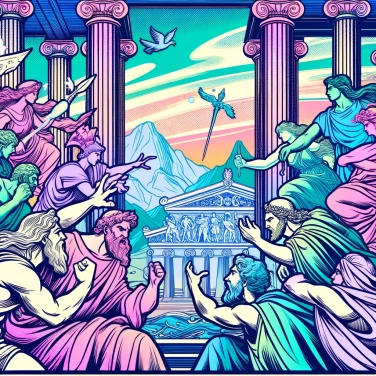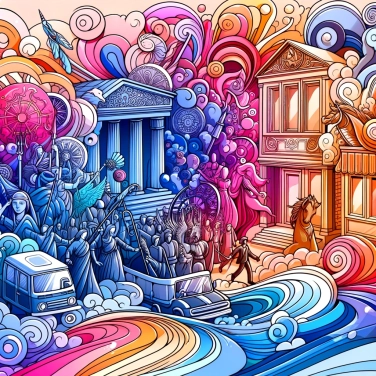The Greek gods were often in conflict due to their human-like nature, filled with power-hungry, jealousy, and rivalries, reflecting the complex aspects of the human condition.

The Greek gods each had their own strong personality and individual ambitions. Zeus, for example, was authoritarian and loved to have control over everyone, which greatly annoyed other deities like Hera, his wife, who was rightly jealous and possessive. Poseidon, Zeus's brother, also had his own power ambitions, especially over the oceans, which automatically caused tensions with Zeus. Athena was known for her intelligence, but she could also be proud and did not hesitate to compete when her expertise was challenged. Each one constantly tried to establish their prestige and assert their superiority, even at the cost of endless quarrels and sometimes absurd rivalries.
The Greek gods feel powerful and often very human emotions. They all have tumultuous love stories. Zeus, for example, never resists his many love affairs, constantly provoking the fierce jealousy of his wife Hera, who is ready to do anything to punish his rivals. Aphrodite, the goddess of love, also regularly complicates things by igniting uncontrollable passions between gods and mortals. Obviously, these situations quickly explode into fierce quarrels, painful revenge, spectacular betrayals, and big family disputes on Olympus, immortal but certainly not at peace!
The Greek gods often fought over who would rule Olympus, this prestigious royal throne with supreme powers. Zeus may have been the undisputed king, but his brothers Poseidon and Hades frequently envied his authority and sometimes tried to subtly challenge his power. Meanwhile, other deities each dominated a specific realm—like Athena with wisdom or Apollo with the arts—and constantly sought to extend their influence. These power struggles sparked jealousies, plots, and rather epic little rivalries in their divine daily lives.
When the Greek gods mingled with humans, it often led to major Olympic troubles. Each deity had their little protégés on Earth, favorite heroes or kingdoms, which inevitably created jealousy. For example, when Aphrodite got involved in Helen's love life, it sparked the Trojan War, a serious clash with Athena and Hera on opposite sides. And since humans were quite fragile and impressionable, the gods loved to play with them like pawns—this inevitably fueled the competition among the deities. In short, these not-so-subtle interventions were perfect for multiplying divine resentments.
Contrary to what one might think, the Greek gods did not represent perfect models for humanity. On the contrary, their flaws, emotions, and conflicts were meant to reflect and explain the moral and emotional complexity of human beings.
The god Hermes, known as a clever messenger and trickster, had a habit of downplaying certain divine conflicts by proposing clever or humorous solutions, proving that even among immortals, humor can be a powerful mediator.
Mount Olympus was home to twelve main deities, but it actually housed several lesser gods as well. This partly explained the numerous conflicts for power and recognition within this complex and competitive divine hierarchy.
Rivalries between the goddesses could sometimes manifest through indirect confrontations on Earth, as illustrated by the episode of the Trojan War, sparked by a beauty contest among Hera, Athena, and Aphrodite, known as 'the judgment of Paris.'
Sure! Here’s the translation: "Yes, despite frequent internal quarrels, some alliances were relatively stable. For example, Zeus, Poseidon, and Hades had divided the world after their victory over the Titans and generally respected their respective realms. Similarly, Apollo and his twin sister Artemis often maintained a harmonious and strong relationship."
Greek mythological stories often served to illustrate values or teachings. The divine conflicts thus showed men the dangers of jealousy, pride, or greed, while warning against the interference of excessive powers or hubris (excessive pride).
Among the most famous conflicts are the war between the Olympians and the Titans (the Titanomachy), the rivalry between Athena, Hera, and Aphrodite that led to the Trojan War, as well as the ongoing conflict between Zeus and Hera due to Zeus's numerous infidelities and Hera's jealousy.
No, the Greek gods were immortal and therefore could not die permanently. However, they could be injured, weakened, or temporarily imprisoned (like the Titans locked away in Tartarus). This intensified their conflicts, as no side could achieve a definitive victory.
Divine conflicts often had direct repercussions on humans. Greek myths frequently show how disputes among deities triggered wars, natural disasters, or tragic fates for heroes and mortals, as clearly illustrated by the Trojan War.
In ancient Greece, the gods were portrayed with very human personalities and emotions, which made them both relatable and accessible to believers. This humanization allowed for the explanation of unexplained phenomena, complex emotions, and human flaws such as jealousy and anger through mythological narratives.

50% of respondents passed this quiz completely!
Question 1/6